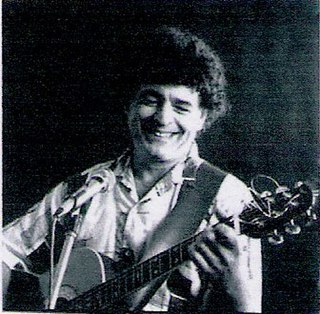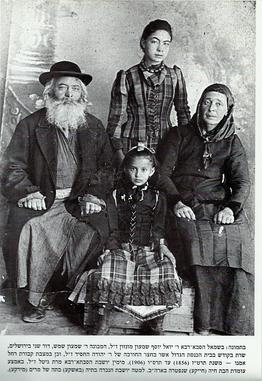The music of Israel is a combination of Jewish and non-Jewish music traditions that have come together over the course of a century to create a distinctive musical culture. For almost 150 years, musicians have sought original stylistic elements that would define the emerging national spirit. In addition to creating an Israeli style and sound, Israel's musicians have made significant contributions to classical, jazz, pop rock and other international music genres. Since the 1970s, there has been a flowering of musical diversity, with Israeli rock, folk and jazz musicians creating and performing extensively, both locally and abroad. Many of the world's top classical musicians are Israelis or Israeli expatriates. The works of Israeli classical composers have been performed by leading orchestras worldwide.

Jerusalem Day is an Israeli national holiday that commemorates the "reunification" of East Jerusalem with West Jerusalem following the Six-Day War of 1967, which saw Israel occupy East Jerusalem and the West Bank, effectively annexing the former. It is celebrated annually on 28 Iyar on the Hebrew calendar, and is marked officially throughout Israel with state ceremonies and memorial services.

Naomi Shemer was a leading Israeli musician and songwriter, hailed as the "first lady of Israeli song and poetry." Her song "Yerushalayim Shel Zahav", written in 1967, became an unofficial second anthem after Israel won the Six-Day War that year and reunited Jerusalem.

"Jerusalem of Gold" is an Israeli song written by Naomi Shemer. Often contrasted with the official anthem Hatikva, the original song described the Jewish people's 2,000-year longing to return to Jerusalem. Shemer added a final verse after the Six-Day War to celebrate the liberation of East Jerusalem and the ancient holy city's unification.

Hadag Nahash is an Israeli hip hop and funk band, founded in 1996 in Jerusalem, which makes leftist political statements in many of its protest songs.

Shaul Tchernichovsky or Saul Gutmanovich Tchernichovsky was a Russian-born Hebrew poet. He is considered one of the great Hebrew poets, identified with nature poetry, and as a poet greatly influenced by the culture of ancient Greece.
Cryptomnesia occurs when a forgotten memory returns without its being recognized as such by the subject, who believes it is something new and original. It is a memory bias whereby a person may falsely recall generating a thought, an idea, a tune, a name, or a joke; they are not deliberately engaging in plagiarism, but are experiencing a memory as if it were a new inspiration.
Mordechai Werdyger is an American Israeli Chasidic Jewish singer and songwriter who is popular in the Orthodox Jewish community. He is the son of cantor David Werdyger and uses the stage name Mordechai Ben David or its initials, MBD. He is known as the "King of Jewish Music" and has released over 40 albums while performing internationally. He has headlined at charity concerts—including those of the HASC and Ohel. On February 27, 2022, he was inducted with the inaugural class of the Jewish Music Hall of Fame.

Nechama 'Nama' Hendel was an Israeli singer.

Shuli Natan (Hebrew: שׁוּלָמִית „שׁוּלִי” נָתָן is an Israeli singer. She is best known for her rendition of "Jerusalem of Gold", written by Naomi Shemer.

Schindler's List: Original Motion Picture Soundtrackis the score album for Steven Spielberg's 1993 film of the same name. Composed and conducted by John Williams, the original score features violinist Itzhak Perlman.

Meir Ariel was an Israeli singer-songwriter and guitarist.

Hakol Over Habibi was an Israeli musical band which represented their country in Eurovision Song Contest 1981 with the song "Halayla". The band consisted of: Shlomit Aharon, Kiki Rothstein, Yuval Dor and Ami Mandelman. They had originally been offered the song "Hallelujah" as a potential Eurovision entry in 1978 but turned it down. The song went on to represent Israel in 1979 but was performed by Milk and Honey winning that year's contest.

Rika Zaraï was a Franco-Israeli singer and writer.

Levin Kipnis, or was born 1890, was an Israeli children's author and poet who wrote mainly in Hebrew and Yiddish. He won the Israel prize in 1978.

Abraham-Leib ben Yitshak Monsohn, known as “Avrom-Leib Shames” (1804-1870), was a member of the first Ashkenazi prayer quorum of Perushim in the Old Yishuv community of Jerusalem at the beginning of the nineteenth century. He was born in Mogilev, and according to family legend, made his way to Jerusalem on horseback in 1832 with other students of the Vilna Gaon. His first wife was Zelda; he later married Dahde, believed to have been of the Maghrebim or North African Jewish community of Hebron. Abraham-Leib was the first beadle and caretaker (shamash) of the Menachem Zion and Rabbi Yehudah He-Hasid (Hurva) synagogues in the Old City of Jerusalem, and of Rachel's Tomb on the outskirts of Bethlehem. He was also an aid to community leader Shlomo Zalman Zoref and in 1836 accompanied him to Egypt to obtain the permission of Muhammad Ali to build the Hurva synagogue. Abraham-Leib's son, Yoel Yosef Shimon Monsohn, called “Shimen Shames,” later assumed the communal tasks his father had performed, by commission of Sir Moses Montefiore. He was in contact with communal leaders of the time such as Yosef Yoel Rivlin, and in fact with all the Russian Jews of the Old Yishuv, since he distributed the Jewish mail for the Russian post office in Jerusalem. Shimen Shames was married to Gittel, whose family migrated to Hebron with fellow members of the Chabad hasidic movement in Shklov in the 1820s. Members of the Monsohn family also intermarried with other Old Yishuv families such as descendants of the Schwartz, Honig and Getz Hacohen families.

Bracha Zefira was a pioneering Israeli folk singer, songwriter, musicologist, and actress of Yemenite Jewish origin. She is credited with bringing Yemenite and other Middle Eastern Jewish music into the mix of ethnic music in Palestine to create a new "Israeli style", and opening the way for other Yemenite singers to succeed on the Israeli music scene. Her repertoire, which she estimated at more than 400 songs, included Yemenite, Bukharan, Persian, Ladino, and North African Jewish folk songs, and Arabic and Bedouin folk songs and melodies.
"We Are Both from the Same Village" is a memorial poem written in 1966 by the Israeli composer Naomi Shemer that she set to music in 1969. It tells about the friendship between two friends from the same village, one of whom was killed in battle.

Ofer Yoel Levy is an Israeli singer and composer, a pioneer of the Turkish and Arab music genres in Israel.















